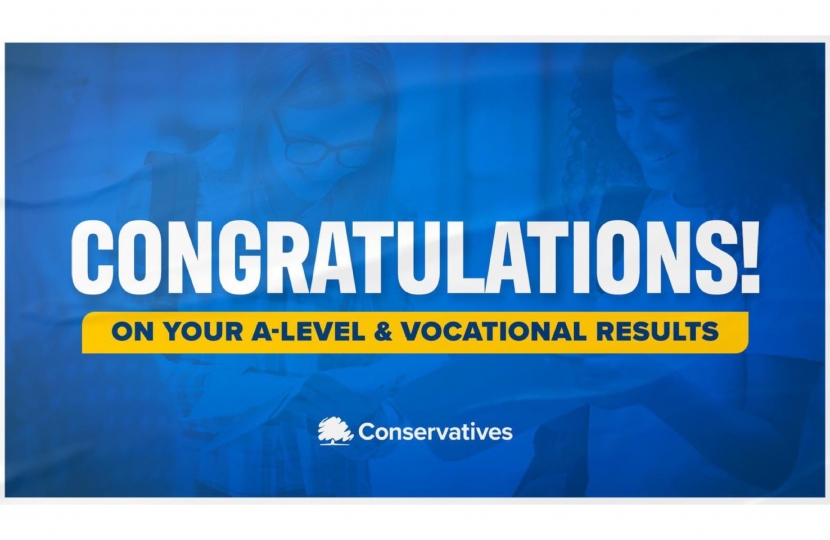
Congratulations to the thousands of young people receiving their A Level results today – after an extraordinary and challenging year, each and every one of them should be proud of their hard work and achievements.
As students collect their A Level and other results today, the Government has ensured that every young person receives the grades that reflect their abilities and potential - so they can progress to the next stage of their lives with confidence.
Young people have shown incredible resilience throughout the pandemic, continuing their education amid unprecedented challenges and while there is no perfect replacement for exams, their efforts deserve to be rewarded fairly. That is why after determining, alongside Ofqual, that it would not be fair for exams to go ahead again this year, the Government put in place measures to ensure students received grades from those who know them best – their teachers, through a combination of mock exams, coursework and essays with rigorous checks in place and no algorithm.
By ensuring students receive grades which truly reflect their ability and potential, we can help every young person progress to the next stage of their education or training, and onto the future they deserve.
Giving students fair results
We are doing this by:
We believe exams remain the fairest and best form of assessment, but the Government and Ofqual decided it would not be fair for exams to go ahead again this year. This was due to the unprecedented disruption the pandemic has caused to education.
Instead, we put in place measures for teachers to determine GCSE and A-level grades, because teachers know their students best. Following our consultation at the beginning of the year, students were only assessed on material they have been taught, and on multiple pieces of work, giving them the fairest possible chance to show what they can do. Teachers have been able to draw on a range of evidence when determining grades, including the use of questions provided by exam boards, mock exams, coursework, or other work completed such as essays and in-class tests covering topics which pupils have been taught. No algorithm has been used.
The Government is also providing a fair way of assessing those who are sitting vocational and technical qualifications, helping them to progress to the next stage of their careers. Students studying vocational and technical qualifications, often taught alongside GCSEs and A levels, and used for university or college places, will also receive grades assessed by teachers rather than sitting exams. Exams and assessments will continue where they are needed for students to demonstrate the necessary professional standards in an occupation.
These measures are subject to rigorous checks, making sure grades reflect what students have achieved. Schools, colleges and other educational settings will conduct multiple checks on the exam results – such as checking consistency of judgement across teachers and that the correct processes were followed – so that there is as much fairness as possible. Exam boards will also conduct their own checks, and every student will have the right to appeal their grade. In fact, one in five schools are having a sample of their grades checked by exam boards.
It is also right that we are working with universities to ensure they take a flexible approach to A Level results, so students are not unfairly disadvantaged because of the pandemic. To make sure students can progress to the next stage of their education, we are encouraging universities to take a fair approach to pupils who have not been able to sit exams, encouraging them to recognise the grades awarded by teachers so young people can fulfil their potential.
We are helping young people catch up on lost learning by:
Launching our Education Recovery Plan to help schools deliver long-term catch-up support, so every child can reach their full potential. As part of our long-term education recovery plan, we will deliver six million 15-hour tutoring courses, targeted at pupils most in need, and provide training and development for teachers. In the next stage of our plan, we are reviewing the impact of time spent in school and college on helping students catch-up.
Investing a total of more than £3 billion in catchup support, so we can help every child who has fallen behind. Our new £1.4 billion package of support builds on the £1 billion Covid Catchup Fund announced last year and the £700 million we are providing for an extensive catch-up programme, which includes a £302 million Recovery Premium to help schools bolster summer provision and support pupils most in need from September.
Eliminating the barrier of digital exclusion, so every child is equipped with the resources they need for a good education. The Government has invested over £400 million to boost remote education, including the purchase of 1.3 million laptops and tablets for students most in need.
For more information on A level results day, including comments from the Education Secretary and Universities Minister, please visit: https://www.gov.uk/government/news/education-secretary-congratulates-students-on-a-level-results-day.
